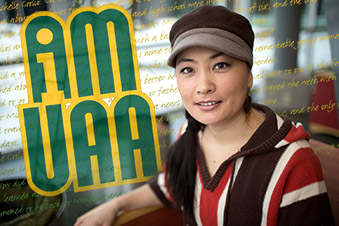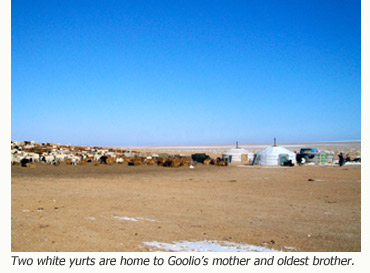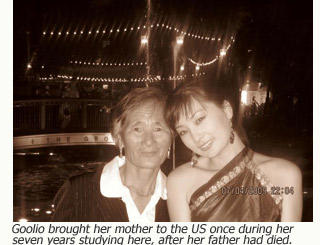I AM UAA: Michelle Goolio
by Ted Kincaid |
 B.A. Social Work, Class of 2013
B.A. Social Work, Class of 2013
Hometown: Gobi Desert, Mongolia
Fun Fact: Went to elementary school by camel
Meet Michelle Goolio. On Sundays, her mother or father would hitch up a small cart to one of the family camels and travel about five hours from their yurt to a nearby small town. Michelle stayed the week with an aunt. On Fridays, her mom picked her up. Junior high and high school were much the same.
The Goolios are Mongolian herders in the Gobi Desert. Michelle is the youngest of six, and the only one to attempt college. She'll graduate from UAA this May with a bachelor's degree in social work.
How did a young woman from Genghis Kahn's home territory end up in Anchorage?
I learned about Goolio from one of her professors, who left a message about this remarkable
young woman determined to go back to Mongolia and introduce better health services
for rural herders.
We met for a chat at a campus cafeteria late one December afternoon. Michelle is only
a name she adopted for ease of use in America; her Mongolian first name is Tumenkhishig.
She's 27.
Her mother, who only went to fourth grade, wanted her to become a herder like her brothers and sisters; she had an intuitive knack with animals and could always bring home the strays. She was a competitive horse racer in the annual Naadam festival.
Despite her talents, Goolio saw the herding life as hard and boring; she longed for the city. "I wanted to wear pink," she says, not the drab grays and greens of the herders.
Selling off half the herd for Michelle's education
 When several bitter winters and summers took half the family's livestock, her mother
relented. Diversifying family skills might be a good idea. Her family sold half the
remaining animals to afford an expensive, one-year English-as-a-second-language school
in Los Angeles.
When several bitter winters and summers took half the family's livestock, her mother
relented. Diversifying family skills might be a good idea. Her family sold half the
remaining animals to afford an expensive, one-year English-as-a-second-language school
in Los Angeles.
Goolio's first plane ride came in 2006 when she flew from Mongolia to South Korea, and on to Los Angeles. She landed with a few suitcases and knowing not a word of English.
Within a year, she had basic English skills and began looking for an American university. She heard about an opportunity in Alaska, where Mongolia's president visited in 2007 and arranged with the University of Alaska for young Mongolians to pay resident tuition. He foresaw the need for engineers and other professionals to develop Mongolia's copper, gold and coal. Mongolia's strategic location-between Russia to the north and China to the west, east and south-makes its democracy significant to the U.S.
Goolio applied for the special program and was accepted. To pay tuition, she worked on the campus horticulture crew; an Anchorage family gave her a place to live. Instead of mining, health care is her passion, based on her unsuccessful attempts to get her father medical help at the big hospital in Ulan Bator.
Personal experience drove her mission
"Herders are looked down upon, not respected," she said. "Even though we had an appointment, they moved people ahead of him." After years of poor care, he died of a heart attack in 2009. Her eyes fill with tears when she thinks about going home after graduation. She's been away seven years; he was alive when she left.
Based on her social work education and exposure to places like the Hickel House, Hospice and the Ronald McDonald House, Goolio is committed to raising money to build a place for rural herders to stay when they come to the city for medical care.
Her efforts in this direction have been greatly facilitated by contacts she's made doing her yearlong social work practicum at the American Cancer Society, where she has been assisting in classes and supporting staff.
 One class is called, "I Can Cope," and offers nutritional advice and help from dietitians.
Another is "Look Good, Feel Better," in which cancer survivors are gifted with donated
cosmetic kits and spend a fun evening learning how to use them.
One class is called, "I Can Cope," and offers nutritional advice and help from dietitians.
Another is "Look Good, Feel Better," in which cancer survivors are gifted with donated
cosmetic kits and spend a fun evening learning how to use them.
"It's quite touching to participate in these classes," Michelle said.
In addition, her social work practicum required that she report progress and receive feedback from a social worker. To that end, she went to the State of Alaska Department of Health and Social Services to connect with Julia Thorsness, coordinator for Comprehensive Cancer Control.
Thorsness and Goolio met weekly and added a social work perspective to her role at the cancer society and a public health approach to her concerns over medical treatment issues for rural Mongolians.
"She is a real joy," Thorsness said.
The similarities between health issues experienced by rural Mongolians and rural Alaskans struck Thorsness immediately. Both live great distances from sophisticated health care. When they have a serious illness like cancer, usually only one major hospital in the country or region treats the disease. In Alaska, that is Providence. In Mongolia, it was the hospital in Ulan Bator where Michelle had taken her father.
Cultural issues resonated as well.
"Rural herders are not poor people, " Thorsness said. They often have huge herds and plenty of financial resources. But they come in from rural areas. They dress differently, they leave behind territory they are familiar with as they try and navigate the city.
Thorsness works closely with Christine DeCourtney at the Alaska Native Tribal Health Consortium. She put Goolio and DeCourtney in touch. DeCourtney also quickly grasped the similarities. She arranged for tours of the Alaska Native Medical Center and a meeting with a manager of the residential facility called Quyana House, for rural Alaska Native residents and their families to use when visiting the Native hospital.
Both Thorsness and DeCourtney helped Goolio begin to think more strategically about how she might make changes in Mongolia.
Perhaps, DeCourtney suggested, Goolio might consider doing a health education program around screenings, like a Relay for Life event, before jumping into a capital fundraising goal to build a Mongolian equivalent to a Hickel House or a Quyana House.
"She's been away from Mongolia for seven years," DeCourney said. "She needs time to reacquaint herself with the country and the way things are now."
Like learning if there is the potential for corporate philanthropy. Mongolia, like Alaska, is rich in minerals and natural resources. Perhaps Goolio could eventually approach those mining entities to find out if they would like to support the kind of housing project she envisions.
Both Thorsness and DeCourtney say they want to stay in touch with Goolio after she returns to Mongolia, continuing ways to brainstorm support for her mission.
"She's a delightful young woman with a huge job ahead of her," DeCourtney said.
 "I AM UAA: Michelle Goolio" is licensed under a Creative Commons Attribution-NonCommercial 4.0 International License.
"I AM UAA: Michelle Goolio" is licensed under a Creative Commons Attribution-NonCommercial 4.0 International License.














